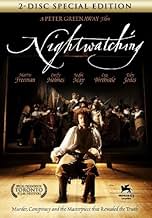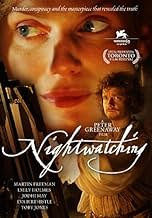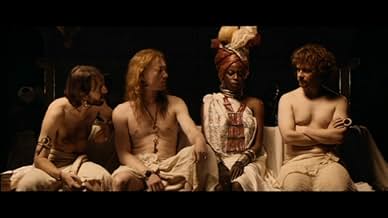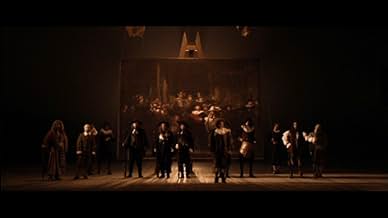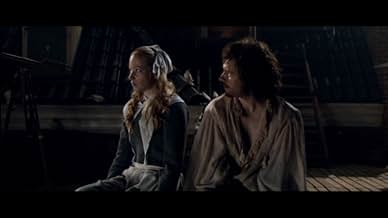IMDb RATING
6.5/10
3.6K
YOUR RATING
An extravagant, exotic and moving look at Rembrandt's romantic and professional life, and the controversy he created by the identification of a murderer in the painting 'The Night Watch'.An extravagant, exotic and moving look at Rembrandt's romantic and professional life, and the controversy he created by the identification of a murderer in the painting 'The Night Watch'.An extravagant, exotic and moving look at Rembrandt's romantic and professional life, and the controversy he created by the identification of a murderer in the painting 'The Night Watch'.
- Awards
- 6 wins & 6 nominations total
Anja Antonowicz
- Catharina
- (as Anna Antonowicz)
- Director
- Writer
- All cast & crew
- Production, box office & more at IMDbPro
Featured reviews
Not as visually complex as 'Prosperos' Books', not as intriguing as 'Draughtsman's Contract', not as innovative as 'The Suitcases', 'Nightwatching' is however a little of everything and, of cause, more.
There are references to the earlier films, most obviously - to the 'Contract', the latest are so strong that sometimes one may think it is a deep 'remake' of that earliest Greenways' work.
While the presentation is generally easier-going then in some previous films, it does not mean loss of depth and loads of small details (for which the film deserves a HD version - something to appear, probably, in the year 2107?). Like all Greenway films, this one to be watched many times to discover new and new layers.
The historic plot is doubtful however neither naive nor unrealistic. And most likely it is just a canvas to put the ideas on: which present in numbers.
There are references to the earlier films, most obviously - to the 'Contract', the latest are so strong that sometimes one may think it is a deep 'remake' of that earliest Greenways' work.
While the presentation is generally easier-going then in some previous films, it does not mean loss of depth and loads of small details (for which the film deserves a HD version - something to appear, probably, in the year 2107?). Like all Greenway films, this one to be watched many times to discover new and new layers.
The historic plot is doubtful however neither naive nor unrealistic. And most likely it is just a canvas to put the ideas on: which present in numbers.
My advice is to first watch 'Rembrandt's J'Accuse', Greenaway's companion film. It fills you in on the background, the characters, the thesis for the conspiracy, and generally sets the scene for 'Nightwatching' itself, which is extremely elaborate and requires a far more prolonged degree of concentration than 99.9% of films being released. Having said that, the film certainly stands alone as a powerful and intelligent piece of cinema that puts forward a contentious and challenging theory about the circumstances surrounding Rembrandt's painting.
Some viewers have pointed out how moving the film is - and indeed it is. But I for one have found ALL of Greenaway's films to be deeply moving. Unlike mainstream directors, he doesn't attempt to tug at the heartstrings, but instead deploys one rich, elegaic, achingly beautiful set piece after another, letting the ideas and associations reach the emotions of the audience. In Greenaway's world, extreme beauty and extreme horror exist cheek-by-jowl - his heroes (more so than his heroines) look for logic and order, and find ultimately chaos and decay - the good go unrewarded, the bad go unpunished - and yet, out of it all, rises a triumphant celebration of life, art, human aspiration, and the possibilities of cinema itself.
If you want a bedtime story about goodies overcoming baddies, look elsewhere. 'Nightwatching', like Greenaway's other work, offers - and demands - much more than that.
Some viewers have pointed out how moving the film is - and indeed it is. But I for one have found ALL of Greenaway's films to be deeply moving. Unlike mainstream directors, he doesn't attempt to tug at the heartstrings, but instead deploys one rich, elegaic, achingly beautiful set piece after another, letting the ideas and associations reach the emotions of the audience. In Greenaway's world, extreme beauty and extreme horror exist cheek-by-jowl - his heroes (more so than his heroines) look for logic and order, and find ultimately chaos and decay - the good go unrewarded, the bad go unpunished - and yet, out of it all, rises a triumphant celebration of life, art, human aspiration, and the possibilities of cinema itself.
If you want a bedtime story about goodies overcoming baddies, look elsewhere. 'Nightwatching', like Greenaway's other work, offers - and demands - much more than that.
I'm really amazed with the work Peter Greenaway did in this movie. I have seen most of his films and this one is now my favourite. It's impressive the way the made every frame a moving Rembrandt's painting. This is pure art cinema. The story is told in a creative way, you can understand the clever mind of Rembrandt, follow his steps in his life focused on his most famous painting "The Night Watch", it could be a "slow" movie but the way "Rembrandt" tells the story makes it smooth; dramatic, funny, and smart. I could frame this movie on a museum. The "Holland" world is perfectly shown, the costume design is superb; every single detail in the movie takes you to 1642. To appreciate this movie you must know who Peter Greenaway is and understand why "cinema" is the 7th art.
This film, which I saw yesterday at a single, sparsely attended 4:00 p.m. show, part of an AFI European film festival, may thrill Greenaway fans, but a broad cross-section of movie lovers will probably find it mannered and dull. Shot Rembrandt-style, it apparently aspires to be an homage to art, to the 17th century artist, and to his early-modern eye for humanity -- the cinematographer keeps coming back to, and lingering over, eye shots -- combined with a detective story, a psychodrama, a domestic drama, a costume drama, a self-conscious allusion to the director's earlier dramas, and a brawling, lusty slice of Low Country life in the era when kings waged war with parliaments, city walls were just starting to come down, and commerce was beginning to muscle aside the gun as the engine of empires.
The film badly needs editing. Everything that happens when a camera is turned on is not necessarily art or even interesting. The 144 minutes I saw would have benefited had they been shrunk by nearly an hour. First kill all of the improvised scenes. Then kill all of the gratuitous sex scenes and needless expletives. Then kill all of the scenes in which an actor talks directly to the audience. Then kill all of the precious, mannered references to other Greenaway films -- statues played by semi-nude actors, sides of beef hung out to dry, etc. etc. Tighten up the detective story. Lighten up the art analysis. Minimize the posing scenes. Voila. You'd be at 90 minutes without any problem.
Not for the uncommitted or the faint of heart.
The film badly needs editing. Everything that happens when a camera is turned on is not necessarily art or even interesting. The 144 minutes I saw would have benefited had they been shrunk by nearly an hour. First kill all of the improvised scenes. Then kill all of the gratuitous sex scenes and needless expletives. Then kill all of the scenes in which an actor talks directly to the audience. Then kill all of the precious, mannered references to other Greenaway films -- statues played by semi-nude actors, sides of beef hung out to dry, etc. etc. Tighten up the detective story. Lighten up the art analysis. Minimize the posing scenes. Voila. You'd be at 90 minutes without any problem.
Not for the uncommitted or the faint of heart.
In my old Balkan country, we used to have a wise saying warning against bothering with a huge sack to collect fruit from a famous fruit tree. This applies almost perfectly to the last Peter Greenway's Anglo-Polish-Dutch super production, around the creation of NIGHT WATCH, one of the most famous paintings in the world. Assassination attempts were performed against this masterpiece, resulting in its sheltering behind a thick glass in the Rijk Museum, and the same shelter may be used against this strange assembly of four-letter words, (predominant in modern movies), naked bodies sometimes sculptural, sometimes dull, and a certain research in the lighting; after almost 150 minutes of sometimes boring, sometimes nonsensical dialogues, the viewer hits home with the impression that his money was stolen. Only two movie theaters adventured to expose this failure (in my eyes, but the audience was heavy and very receptive), at my 4 pm show, in the exclusive artistic district of Saint-Germain des Près.A real waste of talent and efforts. I am not ready to view another Peter Greenway movie.Harry Carasso, Paris, France
Did you know
- TriviaDirector Peter Greenaway has said of this film: "The 'painter film' is a small genre of its own: Michelangelo, Rembrandt himself (at least twice), Modigliani, Caravaggio, etc, and none more so than just lately. Picasso, Van Gogh (repeatedly), Bacon, Vermeer, and now Goya have received the treatment. I suppose our major aim in the film Nightwatching, apart from trying to match the Master's mastery of light, is to demonstrate Rembrandt as social moralist: it contains a murder mystery - the unraveling of which is the heart of the film. And also to regard Rembrandt as an inventor of cinema before the Lumière brothers...We tried to rise to the challenge in the film, remaking, with high definition digital tape, that upper right-hand corner space of Velázquez's Las Meninas - the area between the walls and ceiling has been described as the greatest bit of painting ever - a painting which is just and only and magnificently a painting of a block of darkly contrasting air. We, too, attempting a grand response Rembrandt image of light, tried to film a block of air that insubstantially floats, irrespective of walls and ceiling. Godard said that the cinema was the truth 24 frames a second. Can painting go better and say that paintings are the truth for all time? What's a second in cinema time if you can have an eternity in painting time? Cinema has come and gone in 112 years. What, then, is the age of painting?".
- GoofsAt 1:36:42 Rembrandt says that Geertje doesn't wash herself. Just 1 minute later he says he saw her undressing to wash.
- Quotes
Titia Uylenburgh: Women in the 17th century are allowed to smoke, write, correspond with Descartes, wear spectacles, insult the Pope, and breast-feed babies.
- ConnectionsFeatured in Rembrandt's J'Accuse...! (2008)
- How long is Nightwatching?Powered by Alexa
Details
- Release date
- Countries of origin
- Official sites
- Language
- Also known as
- Nightwatching
- Filming locations
- Production companies
- See more company credits at IMDbPro
Box office
- Budget
- $7,500,000 (estimated)
- Gross worldwide
- $698,544
- Runtime
- 2h 14m(134 min)
- Color
- Sound mix
- Aspect ratio
- 2.35 : 1
Contribute to this page
Suggest an edit or add missing content


